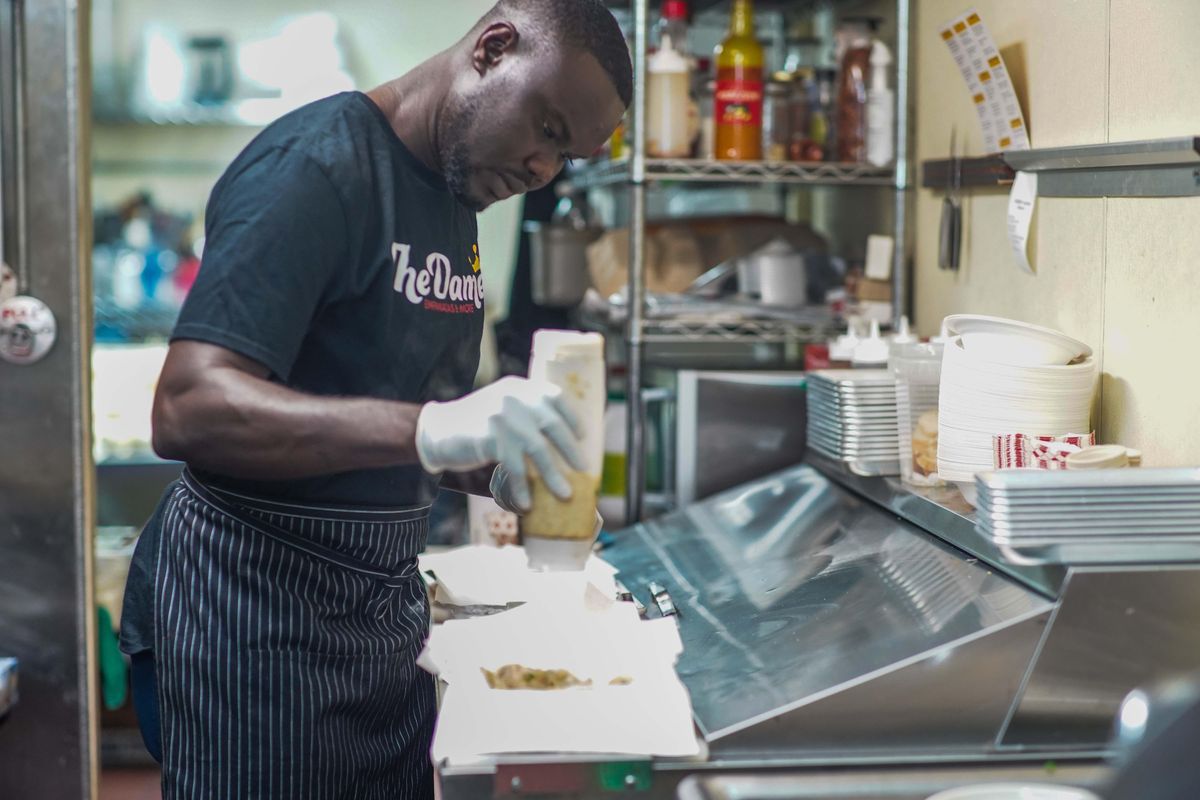Oumar Diouf, born in Meckhe, Senegal, never imagined himself becoming a chef. In fact, it wasn't customary for boys and men in Senegal to learn how to cook. But after his father passed away, his mother became the sole provider for the family's six children, and she spent long hours working, returning home late to cook dinner. This caused enough heartache and tribulation for Oumar to step in and support his mother in the kitchen.
Despite the cultural backlash and mockery from his friends, he knew that cooking was his family's saving grace. One day his mother told him, "You never know when you're going to need this, because life is long. You're helping me and you're getting knowledge."
Senegalese Chef Serves Up African Street Food in Oakland | Dishes of the Diasporayoutube.com
Those words later rang true when Oumar left Senegal to play professional soccer in Argentina at the age of 22. After being let go due to an injury, he soon rediscovered his love for cooking. It was in Argentina where he learned about empanadas and the complex flavors wrapped into each savory pastry, which would later become a best-selling dish at The Damel, his brick-and-mortar restaurant in downtown Oakland.
But Oumar picked up another important experience before coming to the Bay Area. In 2008, three years after he'd moved to Argentina, he successfully opened a restaurant in Necochea, a small town off the coast of Buenos Aires. Despite his success in Argentina, it left him unfulfilled.
While on vacation in Brazil that same year, Oumar noticed something familiar in the sea of people, and their clothing and cuisines. He felt a sense of comfort. He was home.
"I decided to move to Brazil to pursue the idea of finding out more why Brazilian food was so similar to African food. I ended up traveling to Bahia and that's where I kind of like, 'Wow, this is so cool,' because 80 percent of their culture in food and everything is African-descendant."

One of those dishes is called Acarajé, which is similar to Senegal's Àkàrà. Àkàrà, a West African dish, is a bean fritter made from cowpeas. The beans are washed and soaked overnight, then blended with red habañero peppers, onions, red bell peppers, and salt. The mixture is then scooped with a ladle into hot bubbling oil, where it's fried to a golden brown.
Acarajé is made in much the same way, with the variation of being fried in palm oil and stuffed with cassava puréed with coconut milk, and topped with Brazilian vinaigrette salsa. Acarajé is currently a staple at The Damel, where customers rave about the bold yet delicious flavors at play.
When Oumar moved to Oakland in 2017, he began an Afro-Brazilian catering business that quickly flourished after he catered a lunch for Salesforce. In May 2019, he opened his restaurant, The Damel, which features dishes from his travels to Argentina, Brazil, and his home country of Senegal. Along with best-selling Acarajé, it's known for Oumar's empanadas.

The Damel's empanadas are like no other—in fact, the dough is imported directly from Argentina to provide the most authentic flavor. "The ground beef is one of the most popular ones," Oumar explains. "The ground beef, I'm making it in a way that nobody makes it here. We take the fat out, and we put a lot of flavor in it. So it makes you want to eat more, yet feel guilt-free, because it's healthy. Although it has Argentinian influences, I bring my own touch to it. So far, we got a recipe that people love."
Chef Oumar is on a mission beyond his brick and mortar. He developed a food truck that serves customers across the Bay who cannot visit his restaurant. Despite the circumstances of COVID-19, The Damel continues to strive forward; Oumar plans to open 10 more restaurants by 2022. He's also launched a foundation, and hopes to build homes and playgrounds for orphaned children in need.
"Whenever I travel to Senegal, I am disheartened because I see a lot of children in the streets begging…when they're supposed to be playing and learning," Oumar says. "I already built one park, and I am planning on building more parks in each city that I know. It'll be a place where kids can spend their time…instead of the streets."
What started as a way to support his mother and provide for his family has gone beyond the family kitchen table. Oumar has successfully brought cross-cultural flavors to the Bay Area that leave customers coming back time and again.
// The Damel, 1312 Broadway, (Oakland), thedamel.com.

This article was written by Anthonia Onyejekwe for KQED's Dishes of the Diaspora series; kqed.org.





















